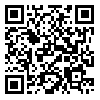Tue, Jan 27, 2026
[Archive]
Volume 1, Issue 4 (12-2022)
RHMS 2022, 1(4): 25-32 |
Back to browse issues page
Download citation:
BibTeX | RIS | EndNote | Medlars | ProCite | Reference Manager | RefWorks
Send citation to:



BibTeX | RIS | EndNote | Medlars | ProCite | Reference Manager | RefWorks
Send citation to:
Khaghanizadeh M, Mohammadian M, Shakibaee A, Fallah M S, Esmaeili Gouvarchin Ghaleh H, Tavakkol R. The empiricism of monitoring, evaluating, and improving the performance of Baqiyatallah University of Medical Sciences in the face of the COVID-19 crisis. RHMS 2022; 1 (4) :25-32
URL: http://jrhms.thums.ac.ir/article-1-56-en.html
URL: http://jrhms.thums.ac.ir/article-1-56-en.html
Morteza Khaghanizadeh 
 , Mohammad Mohammadian
, Mohammad Mohammadian 
 , Abolfazl Shakibaee
, Abolfazl Shakibaee 
 , Mohammad Saleh Fallah
, Mohammad Saleh Fallah 
 , Hadi Esmaeili Gouvarchin Ghaleh
, Hadi Esmaeili Gouvarchin Ghaleh 
 , Reza Tavakkol
, Reza Tavakkol 


 , Mohammad Mohammadian
, Mohammad Mohammadian 
 , Abolfazl Shakibaee
, Abolfazl Shakibaee 
 , Mohammad Saleh Fallah
, Mohammad Saleh Fallah 
 , Hadi Esmaeili Gouvarchin Ghaleh
, Hadi Esmaeili Gouvarchin Ghaleh 
 , Reza Tavakkol
, Reza Tavakkol 

Nursing and Midwifery school, Torbat Heydariyeh University of Medical Sciences, Torbat Heydariyeh, Iran , Tavakkolreza.73@gmail.com
Abstract: (1039 Views)
Decision-making has a broad role in choosing educational interventions and health-oriented planning. These decisions can include small decisions or very big and important decisions in the field of health. Considering that 70% of the organization's problems are repeatable, empiricism is of great importance for organizations. The purpose of this research was to document and record the empirical knowledge of monitoring, evaluating, and improving the performance of Baqiyatallah University of Medical Sciences in facing the crisis of the COVID-19 disease.
The current research is a cross-sectional study in 2021 that was conducted with the participation of 11 managers, experts, and supervisors in the field of monitoring, evaluating, and improving the performance of Baqiyatallah University of Medical Sciences in the face of the COVID-19 crisis. According to the qualitative approach of this study, the sampling was purposeful and data collection was done until the saturation limit was reached. Data collection in this study was done using a semi-structured interview by an experienced expert face-to-face and then converted into text. The analysis of the results in this study was done using descriptive statistical tests (prevalence, frequency percentage) and SPSS, EXELE, and MaxQDA software version 20.
The results of the present study led to the extraction of 327 open codes and seven axial codes of events, problems, measures and decisions, results and outcomes, suggestions, scenarios and patterns, and lessons learned. The highest and lowest frequency of open codes were related to the dimensions of the results and outcomes, and scenarios and patterns with 71 and 17 codes, respectively.
One of the effective measures to face and deal with critical situations such as COVID-19 is regular and organized planning. Based on this, knowing the managerial and organizational challenges and the solutions to face those helps the medical staff to achieve physical and mental health, individual and social, and plays an essential role in providing effective services to patients and society.
The current research is a cross-sectional study in 2021 that was conducted with the participation of 11 managers, experts, and supervisors in the field of monitoring, evaluating, and improving the performance of Baqiyatallah University of Medical Sciences in the face of the COVID-19 crisis. According to the qualitative approach of this study, the sampling was purposeful and data collection was done until the saturation limit was reached. Data collection in this study was done using a semi-structured interview by an experienced expert face-to-face and then converted into text. The analysis of the results in this study was done using descriptive statistical tests (prevalence, frequency percentage) and SPSS, EXELE, and MaxQDA software version 20.
The results of the present study led to the extraction of 327 open codes and seven axial codes of events, problems, measures and decisions, results and outcomes, suggestions, scenarios and patterns, and lessons learned. The highest and lowest frequency of open codes were related to the dimensions of the results and outcomes, and scenarios and patterns with 71 and 17 codes, respectively.
One of the effective measures to face and deal with critical situations such as COVID-19 is regular and organized planning. Based on this, knowing the managerial and organizational challenges and the solutions to face those helps the medical staff to achieve physical and mental health, individual and social, and plays an essential role in providing effective services to patients and society.
Subject:
General
Received: 2023/11/21 | Accepted: 2024/10/2 | Published: 2024/10/2
Received: 2023/11/21 | Accepted: 2024/10/2 | Published: 2024/10/2
Send email to the article author
| Rights and permissions | |
 | This work is licensed under a Creative Commons Attribution-NonCommercial 4.0 International License. |


